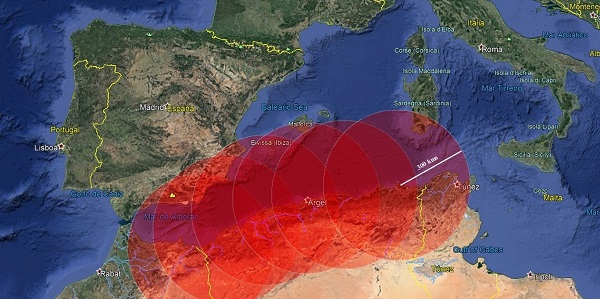Algeria and the domino effect: Morocco, Spain

Analysis 225
Abdelaziz Bouteflika resigned last April, after ruling Algeria for 20 years. However, the country is still controlled by an opaque economic-military structure, often referred to as ‘Le Pouvoir’. Because of it, a representative part of the civil society continues to manifest every Friday since mid-February calling for a truly democratic transition that is not led by ‘Le pouvoir’.
Gaïd Salah – leader of the Algerian army and currently in charge of the country – is carrying out a wave of arrests towards politicians and magnates accusing them of corruption. Although there have been cases of illegal practices, it seems that these accusations aim to justify the need for Salah’s mandate before the Algerian society. At the same time, the Army has reiterated its opposition to any kind of solution to the crisis outside the constitutional path. It is true that abandoning this path can bring disorder and chaos, but Salah and the army could instrumentalize the constitutional process to maintain the status quo and ruin any attempt of a genuine democratic transition.
Algeria is a key trading partner for Spain because it is its second largest buyer of products; mostly gas and oil. Half of the gas we import comes from Algeria. In 2018, Spain exported products worth more than $3.2 billion and imports reached $4.72 million. Moreover, the Maghreb country has great potential regarding renewable energy – especially solar energy -, an emerging market of interest in the medium-long term. In addition, from a strategic security perspective, having a stable Algeria that acts as a border against many threats from the Sahel has been beneficial to Spain for years.
According to the National Security Strategy (NSS) the consequences of instability would affect the interests and increment the threats of Spain. In the economic field, the breakdown of order would mean losing a great trading partner and up to 50% of the natural gas imported by Spain could be cut. As for the political and security aspects, it is never pleasant to have unstable and troubled neighbors since it mostly derives in chaos with disastrous effects as we already know based on the results of similar conflicts in the region. The Spanish political experience could be useful for the Algerian transition and given its weight in the European Union, the elaboration and development of initiatives could be realistic with the support of Italy and France. The Common Security and Defense Policy (CSDP) points out the southern European border as one if its main challenges highlighting the need of reforms to strengthen the security sector and the reconstruction of institutions.
If the natural barrier of illegal immigration falls, then the Spanish coast will be a few kilometers away from chaos fostered by criminal organizations, clans and power groups resulting in the trafficking of drugs, weapons and people. As a contagion effect, the groups that operate in Libya could spread to Algeria and multiply instability in the region, reaching the border of Morocco. It should be clear that today cities like Malaga, Almeria or Murcia are within the range of ballistic missiles of the Algerian arsenal. Specifically, these are the Russian Iskander-E and the Chinese Chaoxun-1, both capable of reaching targets located 280 kilometers away.
Just in case Algeria cannot remain as a stable and reliable country, Spain should start seeking and securing energy alternatives, strengthening its defense capabilities against ballistic missiles in southern Spain, and preparing for large waves of irregular immigration from the Sahel. The next card in the domino effect would be Morocco – particularly Ceuta and Melilla – whose border with Algeria is one of the most militarized in the world.
Albert Vidal Ribé, International Relations, Global Affairs Strategic Studies (University of Navarra)
Responsibility for the information and views set out in this publication lies entirely with the author.